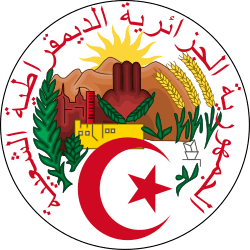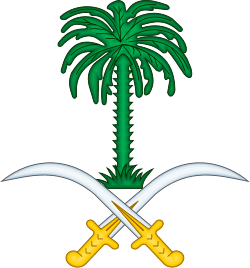Algeria–Saudi Arabia relations
.svg.png) | |
Algeria |
Saudi Arabia |
|---|---|
Algeria–Saudi Arabia relations refer to diplomatic and economic relations between the People's Democratic Republic of Algeria and Kingdom of Saudi Arabia. Both countries are, respectively, the first and second largest Arab states although Algeria is an African country while Saudi Arabia is a Middle Eastern country.[1] Despite this, Algeria and Saudi Arabia have been heavily differed from each other, as Algeria hasn't supported Saudi Arabia in majority of issues, while Saudi Arabia has often enjoyed closer tie with Algeria's rival Morocco, a fellow monarch like Saudi Arabia.
History and political relations
Algeria has consulate general in Jeddah, Saudi Arabia,[2] while Saudi Arabia has embassy in Algiers.[3] Both countries are the members of the Arab League[4] and the OPEC.[5]
Saudi Arabia actively supported the Algerian revolution in 1954 that led to the emancipation of Algeria from the French mandate.[6] On 24 November 1986 two countries signed economic, cultural and technical agreements.[7] In March 1987 the ruler of Saudi Arabia, King Fahd, paid an official visit to the capital city of Algeria, Algiers, and met President Chadli Bendjedid.[8] During the 1980s Algerian young people were sent by the Algerian government to Saudi Arabia for education in the Islamic sciences.[9] This strengthened the Da’wa Salafism, a Salafi inspired social movement, in Algeria.[9]
During the invasion of Kuwait by Iraq in 1990 Algeria did not openly oppose the intervention against Kuwait although Algeria didn't support Saddam Hussein's Iraq, leading to tense relations with Saudi Arabia which defended Kuwait.[10]
Unlike Saudi Arabia, Algeria did not support the decision of the Arab League to assist Arab states that armed opposition groups in the Syrian civil war that began in 2011.[11] Algeria also refused to back the Saudi-led coalition against the Houthis amidst the war in Yemen.[12]
Algerian Civil War
During the Algerian Civil War, the Islamists, notably Armed Islamic Group of Algeria, was supported by Saudi Arabia as well as Iran, Sudan, Morocco and Libya. Algeria had accused Saudi Arabia and these latter nations for their role that caused the deaths of 200.000 Algerians throughout the war. This war quickly changed the view of Chadli Bendjedid, and later, Algerian leaders as well as majority of Algerian population, about Saudi Arabia from friendly to negative, a legacy that remains heavily in Algeria today and the main reason for Algeria's political rifts from Saudi Arabia.
Qatar–Saudi Arabia standoff
Algeria has favored a resolution of political agreement between two nations, therefore portraying themselves as a neutral party during the Qatar crisis.
Economic ties
Saudi Arabia established the Saudi Fund for Development in Algeria.[13] There is also the Algerian-Saudi joint committee which organizes meetings between two countries.[14] Between 1987 and the invasion of Kuwait in 1990 Algeria enjoyed financial support of Saudi Arabia.[15]
As of 2012 Saudi Arabia had investments in Algeria in pharmacological, cement, mineral, paper and chemical fields which amounted SR3.5 billion.[2] It was SR3 billion, equal to $856 million, in 2011.[6]
See also
References
- ↑ "Arabs" (6th Edition). The Columbia Encyclopedia. 2013. Retrieved 27 January 2014. – via Questia (subscription required)
- 1 2 Fouzia Khan (19 November 2013). "Algeria celebrates National Day". Arab News. Jeddah. Retrieved 27 January 2014.
- ↑ "Saudi ambassador to Algeria Receives President of Bureau of Investigation and Public Prosecution". Saudi Press Agency. Algiers. 2 June 2013. Retrieved 27 January 2014.
- ↑ "Arab League" (6th Edition). The Columbia Encyclopedia. 2013. Retrieved 27 January 2014. – via Questia (subscription required)
- ↑ "Algeria steps up oil and gas investment, production: minister". UMCI News. 16 May 2008. Retrieved 27 January 2014.
- 1 2 Roberta Fedele (15 November 2012). "Algerian expats pay tributes to independence war martyrs". Saudi Gazette. Jeddah. Retrieved 27 January 2014.
- ↑ "International Agreements". SAGIA. Retrieved 27 January 2014.
- ↑ "Saudi King Visits Algeria". Los Angeles Times. Algiers. Reuters. 12 March 1987. Retrieved 27 January 2014.
- 1 2 Amel Boubekeur (September 2008). "Salafism and Radical Politics in Postconflict Algeria" (Paper series (No=11)). Carnegie Endowment. Retrieved 27 January 2014.
- ↑ Saudi Arabia Central Bank and Financial Policy Handbook. Int'l Business Publications. 3 March 2005. p. 24. ISBN 978-0-7397-1375-4. Retrieved 27 January 2014.
- ↑ Ghaffar Hussein (25 March 2013). "After the Arab Spring: Algeria's standing in a new world". The Commentator. Retrieved 27 January 2014.
- ↑ "Saudi and Qatar ask Algeria to join force in Yemen". Middle East Eye. 27 October 2016.
- ↑ "Saudi-Algerian committee stresses importance of bilateral relations". Saudi Business News. Algiers. Retrieved 27 January 2014.
- ↑ "Algeria seeks closer ties with Saudi Arabia". KUNA. Algiers. 6 December 2012. Retrieved 27 January 2014.
- ↑ Stephen Zunes (Summer 1995). "Algeria, the Maghreb Union, and the Western Sahara Stalemate". Arab Studies Quarterly. 17 (3). Retrieved 27 January 2014. – via Questia (subscription required)

